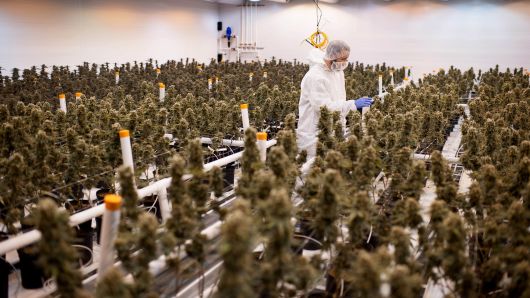
Betting against cannabis stocks has come with large losses and big fees this summer.
A case in point: Aurora Cannabis. Short sellers, investors who profit when a stock price falls, have poured into the Canadian cannabis company’s stock since the start of August. The number of shares shorted rose 76 percent over that period. Their price, though, has climbed 46 percent, including an 18 percent gain Monday after BNN Bloomberg reported that Coca-Cola had held talks with Aurora to develop beverages. That rise has cost short sellers $50 million over the past six weeks, according to S3 Partners, a financial technology and analytics firm.
Since the start of August, shares of publicly traded pot stocks have gained 30 percent, on average, according to IHS Markit. Over that period, short sellers have lost $626 million, according to S3 Partners.
What has driven the rally? Deregulation and interest from some of the biggest beverage companies in the world. As cannabis becomes legal in more countries — in Canada, for example, recreational use will become legal on Oct. 17 — beverage companies are trying to buy into the industry before they become disrupted by it.
This summer, Constellation Brands, which makes Robert Mondavi wine and Svedka vodka, invested $4 billion in Canopy Growth, a publicly traded Canadian cannabis producer. Heineken’s Lagunitas brand has started selling nonalcoholic sparkling water featuring THC, the active component of marijuana. And Molson Coors has formed a joint venture with Hexo, a weed producer, to make cannabis-infused beverages.
The industry has attracted enough interest from beverage companies that Riposte Capital this month called on Hexo to sell itself or seek a direct investment from Molson Coors.
The industry’s skeptics haven’t given up in the face of this run-up. Over the last two weeks, short sellers have increased their bets against a number of cannabis companies, but the bets come with high costs.
Short sellers borrow shares and then sell them in the hopes of buying them back later at a lower price to profit on the difference. Those lending the shares charge a fee, which can go up as it becomes more difficult to get ahold of the shares. That’s the problem facing those shorting cannabis stocks: There are few shares to borrow.
The $1.5 billion short bet against cannabis stocks is costing $2.4 million a day, or 200 times more than an equivalently sized bet against a basket of stocks including Apple, Amazon, IBM and Goldman Sachs, said Ihor Dusaniwsky, head of predictive analytics at S3 Partners.

